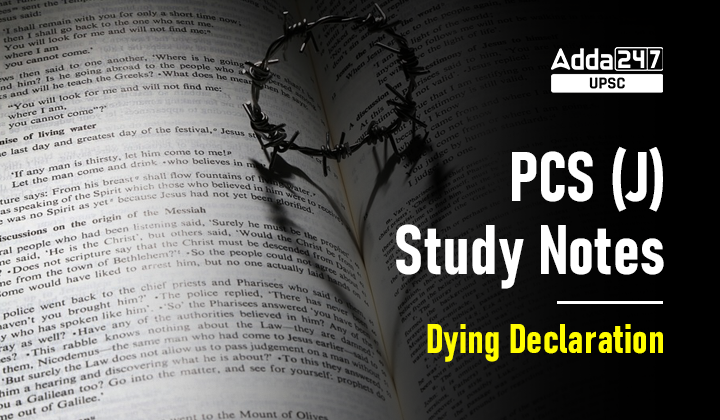Table of Contents
Dying Declaration
The Indian Evidence Act, Section 32 (1), defines when a statement is made by a person as the cause of his death or as any of the circumstances of the transaction which resulted in his loss of life, in instances in which the cause of that person’s death is called into question. The statement may be made in reference to the cause of death or to any of the circumstances of the transaction. Such statements made by the person are relevant regardless of whether the person who made them was alive or not at the time when they were made, under the expectation of death, and regardless of the nature of the proceeding in which the cause of his death is brought into question. This is because such statements can be used to infer the person’s state of mind at the time when they were made.
According to Section 32(1) itself:
- A statement may be oral and written. But in Emperor vs. Abdullah it was held that Conduct to be relevant as dying declaration.
- The statement must be as to:
- Cause Of Death
- Circumstances Of The Transaction
- Resulted In The Death
In the case of Pakala Narayan Swamy v. Emperor (1939), it was ruled that the deceased’s remark to his wife that he was going to the accused to collect money from him (the accused was in debt to the deceased) was acceptable under section 32. (1).
According to section 32(1) of the Indian Evidence Act, 1872, as interpreted by the court in Mahmood Illahi vs. State of Uttar Pradesh (1990), a report made by the deceased to the police officer describing the reason of his death or the circumstances that caused his death shall be relevant.
Anyone, including a law enforcement officer, can record a dying person’s declaration. A Judicial Magistrate’s recording adds credibility and authority to the document. On the basis that “Nemo moriturns proesumitur mentiri,” or “a man will not meet his maker with a lie in his mouth,” the dying declaration is permitted.
Substantive evidence such as a dying declaration can serve as the only basis for a verdict. The weight given to a dying declaration must be proportional to the specifics of each instance. If the court determines that the statement was made voluntarily and in good faith, it may not need any additional proof. It may, however, be backed up by other evidence if and when it becomes necessary.
मरने की घोषणा
भारतीय साक्ष्य अधिनियम, धारा 32 (1) परिभाषित करता है कि जब कोई व्यक्ति अपनी मृत्यु के कारण के रूप में या लेन-देन की किसी भी परिस्थिति के रूप में बयान देता है, जिसके परिणामस्वरूप उसकी जान चली जाती है, ऐसे उदाहरणों में जिसमें उस व्यक्ति की मृत्यु पर प्रश्नचिह्न लगाया जाता है। बयान मृत्यु के कारण या लेनदेन की किसी भी परिस्थिति के संदर्भ में किया जा सकता है। व्यक्ति द्वारा दिए गए इस तरह के बयान प्रासंगिक हैं, भले ही उन्हें बनाने वाला व्यक्ति जीवित था या नहीं, जब उन्हें बनाया गया था, मृत्यु की उम्मीद के तहत, और कार्यवाही की प्रकृति की परवाह किए बिना जिसमें उसकी मृत्यु का कारण है प्रश्न में लाया गया। ऐसा इसलिए है क्योंकि इस तरह के बयानों का इस्तेमाल उस समय व्यक्ति की मनःस्थिति का अनुमान लगाने के लिए किया जा सकता है जब वे किए गए थे।
धारा 32(1) के अनुसार ही:
- एक बयान मौखिक और लिखित हो सकता है। लेकिन बादशाह बनाम अब्दुल्ला में यह माना गया कि आचरण को मृत्युकालीन घोषणा के रूप में प्रासंगिक होना चाहिए।
- कथन इस प्रकार होना चाहिए:
- मौत का कारण
- लेन-देन की परिस्थितियाँ
- मौत में परिणाम
पकाला नारायण स्वामी बनाम सम्राट (1939) के मामले में, यह फैसला सुनाया गया था कि मृतक की अपनी पत्नी की टिप्पणी कि वह आरोपी से पैसे लेने के लिए जा रहा था (आरोपी मृतक के कर्ज में था) धारा 32 के तहत स्वीकार्य था।
भारतीय साक्ष्य अधिनियम, 1872 की धारा 32(1) के अनुसार, जैसा कि महमूद इलाही बनाम उत्तर प्रदेश राज्य (1990) में अदालत द्वारा व्याख्या की गई है, मृतक द्वारा पुलिस अधिकारी को उसकी मृत्यु का कारण बताते हुए एक रिपोर्ट दी गई है या उनकी मृत्यु का कारण बनने वाली परिस्थितियां प्रासंगिक होंगी।
कानून प्रवर्तन अधिकारी सहित कोई भी व्यक्ति मरने वाले व्यक्ति की घोषणा दर्ज कर सकता है। एक न्यायिक मजिस्ट्रेट की रिकॉर्डिंग दस्तावेज़ में विश्वसनीयता और अधिकार जोड़ती है। इस आधार पर कि “निमो मोरीटर्न्स प्रोसुमिटुर मेंटिरी,” या “एक आदमी अपने निर्माता से उसके मुंह में झूठ के साथ नहीं मिलेगा,” मरने से पहले घोषणा की अनुमति है।
मृत्यु से पहले की घोषणा जैसे ठोस सबूत फैसले के लिए एकमात्र आधार के रूप में काम कर सकते हैं। मृत्यु-पूर्व घोषणा को दिया गया भार प्रत्येक उदाहरण की विशिष्टियों के समानुपाती होना चाहिए। यदि अदालत यह निर्धारित करती है कि बयान स्वेच्छा से और सद्भाव में दिया गया था, तो उसे किसी अतिरिक्त सबूत की आवश्यकता नहीं हो सकती है। हालाँकि, यदि आवश्यक हो तो अन्य साक्ष्यों द्वारा इसका समर्थन किया जा सकता है।



 TSPSC Group 1 Question Paper 2024, Downl...
TSPSC Group 1 Question Paper 2024, Downl...
 TSPSC Group 1 Answer key 2024 Out, Downl...
TSPSC Group 1 Answer key 2024 Out, Downl...
 UPSC Prelims 2024 Question Paper, Downlo...
UPSC Prelims 2024 Question Paper, Downlo...






